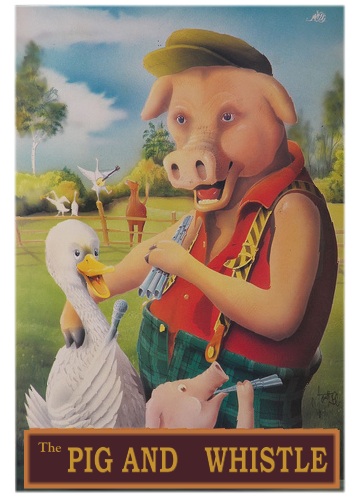
The gaps between 'pig' and 'and' and 'and'
and 'whistle' are different sizes.
Image and caption courtesy of Sean Sollé.
Language is a tool. Like any tool, the results of its usage depend enormously on the person wielding it. For example, consider the following sentence by Thomas Paine:
These are the times that try men's souls.
This sentence has a certain appeal, a sense of rhythm and rightness, that other formulations lack, though identical in meaning:
These times try men's souls.
Men's souls are tried by these times.
If you can appreciate the difference, then you have a good grasp of the nuances expressible in the English language. There are many fascinating ways to go beyond the surface meaning, one of which is to play games with the language. For example, construct a paragraph that doesn't use the letter 'e'. Or a paragraph that doesn't repeat any words.
One such language game is to construct sentences that contain the same word repeated in succession. Can you think of a legitimate sentence with that property? For example:
I told him that that was the reason.
There are many such classes of sentences. Of equal interest are sentences that contain some word twice in succession, but do so only by 'cheating.' In fact, there is an interesting continuum between obvious cheaters and completely legitimate sentences.
An extreme case is a garbage sentence:
Monkey hungry ate ate no stop.
An otherwise grammatical sentence may contain a direct quote that is ungrammatical:
The drunken man muttered "Dizzy home home tired" in his sleep.
"Mama milk milk toy" gurgled the baby.
Proper nouns may be repeated without violating grammatical correctness:

Both grand-fathers' first names were John, so, strictly following family tradition, the eldest son was named John John Wetherell.
Clauses may be juxtaposed such that the last word in one clause is the same as the first word in the other:
Then I hit Fred, Fred being the cause of the argument.
Some words are the same if punctuation is ignored:
As for hard work, I think it's its own reward.
His cant can't deter
me.
His wont won't let him do it.
The deer's nose glistens, but the doe's
does not.
Different words that happen to be spelled the same may be juxtaposed. Sometimes the words are pronounced differently. Such word pairs are quite rare.
The properties of lead
lead people to avoid it.
The poems that he read read
beautifully.
He can can the fruit.
The shoe polish from Denmark is superior to Polish polish.
The killer of the deer and the does does not show any remorse.
The dove dove into the lake.
The violinist wanted to take a bow bow in
hand.
The people who touch the wire that is live
live no longer.
Sometimes the different words are pronounced the same, despite having unrelated meanings:
The states that are flatter flatter the rest.
The cheap chisel did not last, but the saw saw the end of the project.
There are many cases where the repeated words, pronounced identically, have related meanings:
The magnificence of the shows shows the talent of the producer.
The plant with flowers flowers every spring.
Many people who read that travel book book their vacations online.
As Laird Nelson reminded me, this can be arbitrarily nested in certain cases:
Buffalo buffalo buffalo Buffalo buffalo. (Bison from the city of Buffalo, NY, baffle other bison from that city.)
Different parts of speech may be spelled the same:
I told her her father had called.
Finally, in the most legitimate class of sentences matching this criterion, the exact same word, with the same meaning, may be repeated:
I told him that that was the reason.
A particularly interesting example of this case involves sentence constructions akin to the placement of the verb after the subject and object in German:
A rat killed a worm, and then a bird killed the rat. The rat the bird ate ate a worm.
This can be carried to arbitrary levels of nesting, yielding perfectly grammatical but increasingly strained sentence constructions:
In the above, a cat finally ate the bird. The rat the bird the cat ate ate ate a worm.
The infant the child the man the woman saw saw saw saw nothing.
Prepositions can be similarly repeated (as long as you don't think that a preposition is a terrible thing to end a sentence fragment with):
The man the dog barked at at the park was old.
This means: The man at the park was old. Which man at the park? The man at whom the dog barked at the park was old.
Similar examples involving the prepositions "on", "to" and "by":
The woman the dog sat on
on the hill was tall.
The girl visited the boy the dog sat next to
to apologize.
The boy visited the girl the cat sat by
by train.
This means: The boy visited the girl by train. Which girl? The boy visited the girl by whom the cat sat by train.
A similar example, from xkcd.com/745:
I kept doing 'doing 'doing it wrong' wrong' wrong.
And another, from xkcd.com/2793:
Arboretum Owner Denied Standing in Garden Path Suit on Grounds Grounds Appealing Appealing
If you understood that last sentence on first reading, reading comprehension must be one of your strengths, strengths such as that being very valuable!